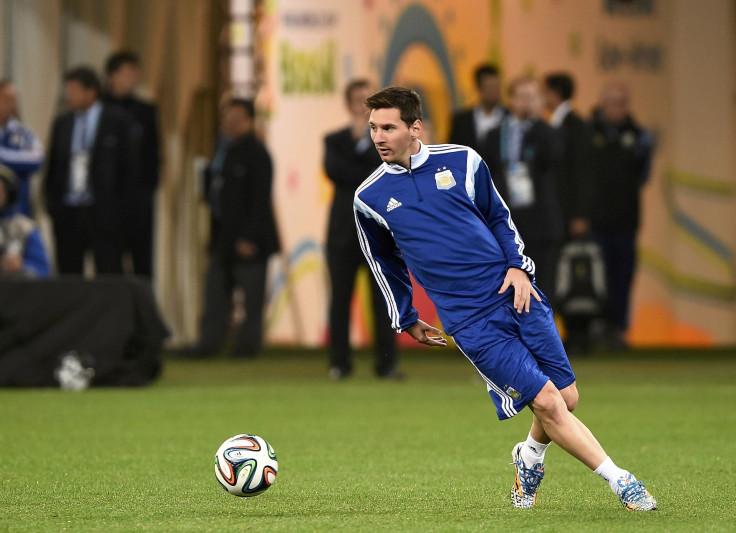Argentina vs. Netherlands: Lionel Messi And Arjen Robben Battle For Chance At Ultimate Redemption In 2014 World Cup Semifinal

Two of the undoubted stars of this World Cup will square off in the semifinals on Wednesday, with both targeting vindication and the one major trophy to elude them in their glittering careers. When Argentina meets the Netherlands in Sao Paulo there will be plenty of talent on show, but the balance of the match will rest heavily on the performances of Lionel Messi and Arjen Robben.
It is somewhat preposterous that Messi would still be under pressure to prove anything after scoring at an unprecedented rate as Barcelona became the dominant team in Europe and arguably the greatest club side of all time. Yet his failure to come up with the same brilliance on the stage by which legends of the game have traditionally been judged, the World Cup, has some still questioning his place among the very best of all time. The legacy of Messi’s compatriot, Diego Maradona, which was etched by leading Argentina to their last World Cup success in 1986, still looms over the 27-year-old. The clean-cut Rosario native who moved to Barcelona at age 13 may never be viewed with the same fondness in Argentina as Maradona, the loveable rogue from the rough streets of Buenos Aires, but lifting the World Cup would cement his greatness on the pitch.
Messi could not have done more toward achieving that goal so far in Brazil. Having scored as a teenager in 2006 and having hardly disgraced himself despite not scoring as part of a shambolic Maradona-coached team in 2010, Messi’s World Cup record was not nearly as bad as some liked to make out. But he has certainly stepped up to a new level this time around.
With Argentina making an at-best stuttering start, Messi scored brilliant, decisive goals in Argentina’s first two matches against Bosnia-Herzegovina and Iran, before netting twice in a 3-2 win over Nigeria. Come the knockout phase, Messi finally received some assistance, but it was still he who was the orchestrator. His ability to find space and his trademark incredible close control were crucial in setting up the only goals of the game against Switzerland and then against Belgium in the quarterfinals.
When taking on the Netherlands, Messi will be without the man who capitalized on his assist against the Swiss and the player who has looked best able to fill the sidekick role, Angel di María. With the stakes even higher, in what is Argentina’s first World Cup semifinal since Maradona left the stage, the pressure on Messi increases still further.
Robben doesn’t have nearly the same weight of expectation on his shoulders, yet he has his own critics to answer and his own wrongs to right. Four years ago in South Africa, the World Cup final was still goalless in the second half when Robben was sent clean through on the Spanish goal by Wesley Sneijder. The ultimate prize was staring Robben right between the eyes. He failed to grab it. Iker Casillas saved and just over an hour later, it was Spain who left the Netherlands undisputed as the greatest soccer nation never to have won the World Cup.
Two years later Robben had a similarly agonizing experience. This time it was the Champions League final, when, with the scores tied between Bayern Munich and Chelsea in extra time, Robben had his penalty saved before his team went on to lose in a shootout. Incredibly, that bitter disappointment came just a month after another Robben penalty miss effectively cost Bayern the Bundesliga title.
Since then Robben has transformed his reputation from final choke artist to a man for the big occasion. In the Champions League final last year, Robben scored an 89th-minute winner to beat Borussia Dortmund. Less than two months ago he got the crucial goal against the same opponents in the German Cup final. He is now just one match away from being a position to continue that incredible streak and atone for the one final misstep that continues to haunt him more than any other.
His form over the past month suggests he is more than capable of inspiring the Netherlands to oust Argentina and move on to a chance for his country to make it fourth-time lucky in a World Cup final. Robin van Persie’s flying header may have got the headline against Spain, but it was the pace of Robben running in behind the ragged Spanish defense that tore the holders apart. He added to his two goals there with another against Australia and, while he hasn’t scored since, he has continued to be a thorn in the side of every team the Netherlands have faced.
Whether playing out wide or in a more unfamiliar position through the middle, Robben’s movement has been superb. To add to his maturing nous, the 30-year-old has defied the passing of time to remain every bit as quick as when he came to wide prominence with Chelsea 10 years ago.
The Netherlands’ reliance on Robben may not quite have reached the so-called Messi-dependence of Argentina, but it is not all that far off. After winning everything that matters at club level and already having lit up this World Cup, both now seek to outdo the other in Sao Paulo and get a shot at the biggest trophy of them all.
© Copyright IBTimes 2025. All rights reserved.





















